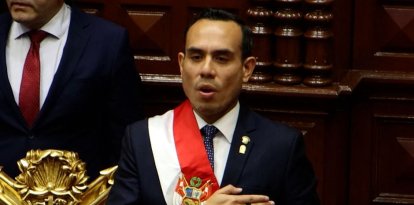Joe Rogan says he feels "horror" because of the case of Venezuelan barber deported to El Salvador
In his podcast The Joe Rogan Experience, Rogan told Kisin that a controversial case he had recently read about from journalist Glenn Greenwald was that of barber Andry Hernández.

Joe Rogan, in a file image.
Famed podcaster Joe Rogan spoke with his colleague and political analyst Konstantin Kisin about the deportations of Venezuelan migrants that the administration of U.S. President Donald Trump has been carrying out in recent weeks to El Salvador, explaining the "horror" represented by those cases in which Administration officials accused without much evidence several of being part of the terrorist group Tren de Aragua, and they were taken to the maximum security prison CECOT in El Salvador as a consequence.
After praising the White House for the way it has drastically reduced the number of migrants crossing the southern border illegally, Rogan commented that he felt "fear" when thinking about the cases of those who are neither criminals nor have criminal records and yet are deported to the notorious Central American country's jail. In his podcast The Joe Rogan Experience, Rogan told Kisin that one controversial case he had recently read about from journalist Glenn Greenwald was that of barber Andry Hernandez.
"But the thing is, like, you have to get scared that people who are not criminals are getting, like, lassoed up and deported and sent to, like, El Salvador prisons. Like, that kind of shit. Because I read some story, can you explain the story for people who don't know what it's about?" Rogan asked Kisin.
"“Well, from what I read, I think it was in Time Magazine, Jamie; if you can pull it up, maybe we can get it accurate. But basically, with a bunch of these Tren de Aragua guys, allegedly, they got one guy, at least one guy, who wasn’t a criminal, who was just a gay barber, who I think, according to the story, came here legally. He was here legally. That's what they said," the political analyst explained.
A "horrible" situation
Similarly, Kisin detailed that the case is extremely sensitive and recalled a time when they touched on the subject with executives of the Heritage Foundation and the Department of Government Efficiency (DOGE). "We brought this up. Because I think we talked about this with DOGE as well. When you do things quickly and you do things aggressively, that’s how you get shit done. But that’s also when mistakes get made. And I think a human being, being plucked out of nowhere and ending up in a country he’s never been in, in a maximum security prison with gang members, seems like a bad thing to happen to me," the political analyst explained.
">Listen to Joe Rogan (and @KonstantinKisin) talk about whether the US Govt should be able to throw alleged gang members into an El Salvadoran prison, potentially for life, without even a sliver of due process or opportunity to show that the accusations against them are untrue: pic.twitter.com/61e49zLgY6
— Glenn Greenwald (@ggreenwald) March 30, 2025
To this, Rogan responded that it was a horrific situation that even discredited the cause of deporting the most dangerous gang members by arguing that, even though everyone could agree on the importance of this act, deporting innocent people is something simply unacceptable. “It’s horrific. It’s horrific That’s horrific. And that’s, again, that’s bad for the cause. Like, the cause is, let’s get the gang members out. Everybody agrees. But let’s not get innocent gay hairdressers lumped up with the gangs? And then, like, how long before that guy can get out? Can we figure out how to get them out? Is there any plan in place to alert the authorities that they’ve made a horrible mistake and correct it?" asked Rogan.
Kisin responded that the situation becomes terribly sinister when viewed from a governmental point of view, explaining that the government will probably never admit its mistake in this matter. “Well, if you think about it from a government perspective, and this is where I think it gets quite sinister, it is, once you’ve done that, the incentive structure is never going to be to admit that and deal with it. The incentive structure is to say nothing, to cover it up, to pretend it didn’t happen. So someone ends up in a black hole. But we’ve seen it. We’ve seen it in every country, including in America,” Kisin said.
























